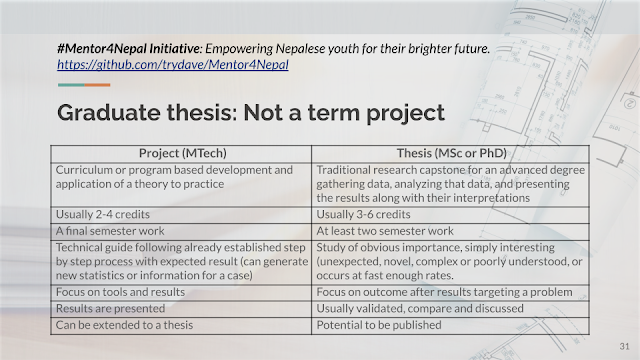Term project vs thesis for a graduate degree
A term project and a thesis are both significant academic assignments that graduate students complete.
Term Project: A term project is a shorter, more focused assignment that is typically completed in a single semester. Term projects often involve gathering and analyzing data, developing a solution to a problem, or creating a product or service. The purpose of a term project is to demonstrate that the student has mastered the material covered in a particular course.
Thesis: A thesis is a longer, more comprehensive research project that is typically completed over the course of a year or more. Theses often involve conducting original research, developing a new theory, or making a significant contribution to the field of study. The purpose of a thesis is to demonstrate that the student has the skills and knowledge necessary to conduct independent research and to make a significant contribution to their field.
Here are some similarities between term projects and theses:
- Both require students to conduct research. Term projects and theses both require students to gather and analyze information in order to complete their work.
- Both require students to write a comprehensive report. The report for a term project or thesis should be well-organized and well-written, and it should present the student's findings in a clear and concise way.
- Both require students to defend their work in front of a committee. In most cases, students will be required to present their work to a committee of faculty members. This is an opportunity for the students to answer questions about their research and to defend their findings.
- Both require students to demonstrate critical thinking, analytical skills, and the ability to communicate their ideas effectively. Term projects and theses are both challenging assignments that require students to use their critical thinking, analytical, and communication skills.
- Both are typically completed under the guidance of a faculty advisor.
- Both require students to adhere to specific formatting and style guidelines.
- Both may involve the use of data collection and analysis methods, such as surveys, interviews, and experiments.
- Both may require students to present their findings to an audience.
- Both can be a valuable learning experiences for students, as they provide an opportunity to apply the knowledge and skills they have learned in their coursework.
And here are some differences between thesis research and term project work for graduate degrees:
- Length and scope: Term projects are typically much shorter and less comprehensive than theses. Term projects may be completed in a single semester, while theses may take a year or more to complete. This means that theses are typically much more in-depth and require a greater level of research and analysis.
- Level of independence: Term projects are typically completed under the close supervision of a faculty advisor, while theses are more independent in nature. Students who are working on a thesis are typically given more freedom to choose their research topic and to develop their own research methods. This means that students who are working on theses have more responsibility for their own learning and must be able to effectively manage their time and resources.
- Expected outcomes: Term projects are typically expected to demonstrate that the student has mastered the material covered in a particular course. Theses are typically expected to make a significant contribution to the student's field of study. This means that theses must be of a higher quality and must demonstrate a greater level of original thinking and research.
- Required skills: Term projects typically require students to demonstrate their ability to gather and analyze data, write a comprehensive report, and present their findings to an audience. Theses, on the other hand, also require students to demonstrate their ability to conduct original research, develop a new theory, or make a significant contribution to their field. This means that students who are working on theses must have a strong foundation in research methods and be able to effectively communicate their findings to a scholarly audience.
- Typical topics: Term projects typically focus on a specific problem or issue within a particular field of engineering or science. Theses, on the other hand, can address a broader range of topics, and may even involve interdisciplinary research. This means that students who are working on theses have the opportunity to explore new areas of research and to develop their own unique perspective on a particular topic.
- Grading: Term projects are typically graded on a pass/fail basis, while theses are typically graded on a scale of A to F. This means that theses are held to a higher standard than term projects.
In general, theses are considered to be a more rigorous academic exercise than term projects. They require students to demonstrate a higher level of critical thinking, analytical skills, and research skills. As a result, theses can be a valuable learning experience for students, and they can also be a helpful way to prepare for a career in research or academia.
Here are some additional tips for students who are working on theses:
- Choose a topic that you are passionate about: This will make the research process more enjoyable and will help you to stay motivated.
- Develop a clear research plan: This will help you to stay on track and to avoid getting sidetracked.
- Set realistic goals: Don't try to do too much too soon. Break down your project into smaller, more manageable tasks.
- Get feedback from your advisor regularly: Your advisor can provide you with guidance and support throughout the research process.
- Don't be afraid to ask for help: There are many resources available to help you with your thesis, such as your advisor, the library, and online research databases.
- https://students.uu.nl/sites/default/files/geo-iees-rubric_master_thesis_imew.pdf
- https://www.ugent.be/ea/bme/en/rubrics_master-thesis.pdf
- https://luddy.iupui.edu/files/info-b691-rubric.pdf
- https://www.liberty.edu/media/1118/PhD_CES_Dissertation_Rubric.pdf
- https://www.ufs.ac.za/docs/default-source/regulations-documents/rubric-masters-dissertation-1004-eng.pdf
- https://www.winthrop.edu/uploadedFiles/coe/PESH/RubricFinalThesisProject.pdf
- https://www.augusta.edu/gradschool/documents/2018-rubric-phd.pdf
- https://effectiveness.syr.edu/wp-content/uploads/2018/08/Dissertation-Proposal-Rubric.pdf
- https://www.sc.edu/study/colleges_schools/engineering_and_computing/internal/documents/teaching_curriculum/thesis_dissertation_rubric_template.pdf
- https://polytechnic.purdue.edu/sites/default/files/files/GEC%2009%20Thesis%20and%20Defense%20Form%20Polytechnic%20v3.pdf
- https://inside.tamuc.edu/academics/graduateschool/thesis%20and%20dissertation%20services/graduate%20rep%20rubrics.aspx
- https://opair.psu.edu/assessment/graduate-rubrics/
- https://www.k-state.edu/assessment/toolkit/measurement/gradrubrics.html
- https://engineering.cmu.edu/education/academic-policies/graduate-policies/thesis-dissertation.html#m.s.-thesis-and-ph.d.-dissertation-due-dates
#termproject #thesis
#graduatedegree #engineering #science #research #datascience #machinelearning #artificialintelligence
#bigdata #analytics #statistics #mathematics #programming #coding #softwareengineering
#computerscience #education #learning #teaching #career #jobsearch #professionaldevelopment
#networking #conferences #workshops #seminars #mentoring #coaching #self-development
Declaimer: This article was
generated with the help of Bard, a large language model from Google AI. Bard is
still under development, and it is not able to generate text that is completely
accurate or error-free. The information in this article is for general
informational purposes only and should not be considered a substitute for
professional advice.
I, Tri Dev Acharya, do not make any representations or
warranties of any kind, express or implied, about the completeness, accuracy,
reliability, suitability, or availability of the information. Any reliance you
place on this information is strictly at your own risk. I will not be liable
for any loss or damage arising from the use of this article or any links
provided.




Comments
Post a Comment